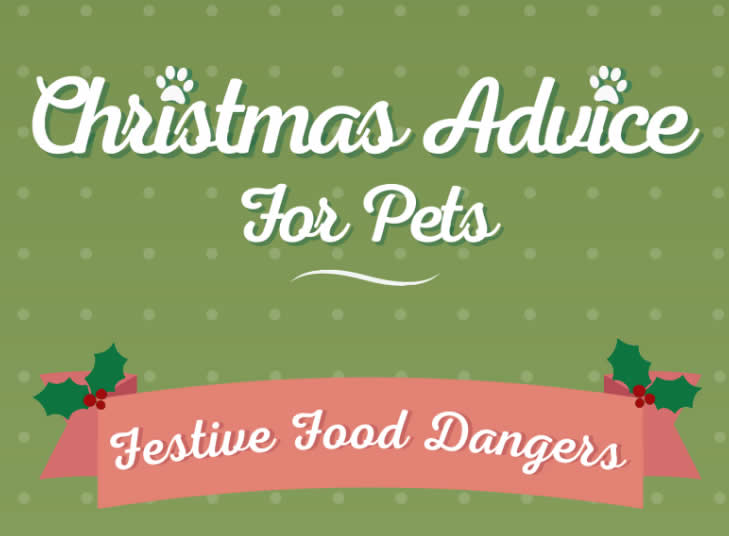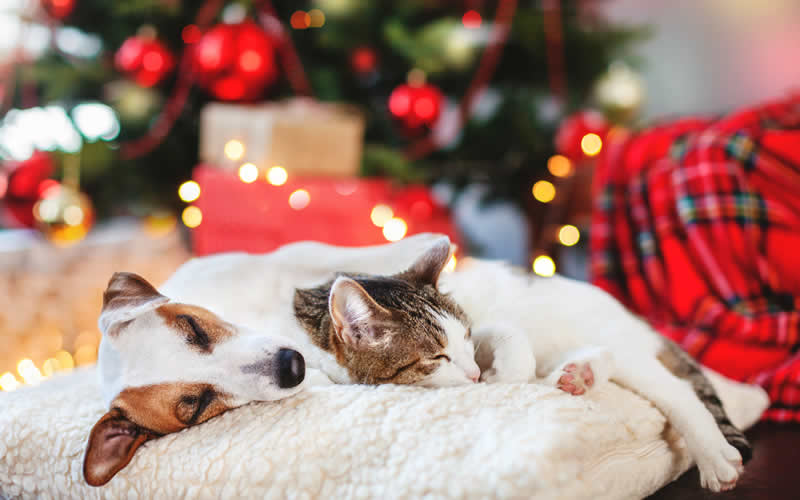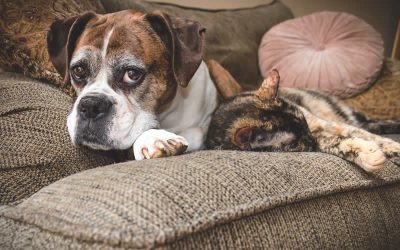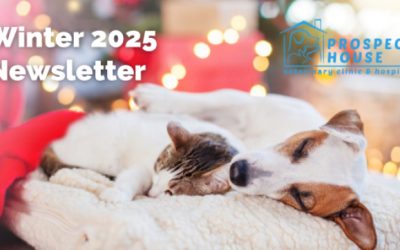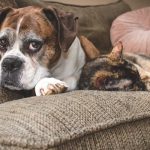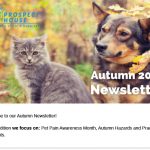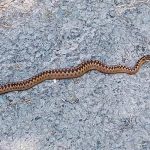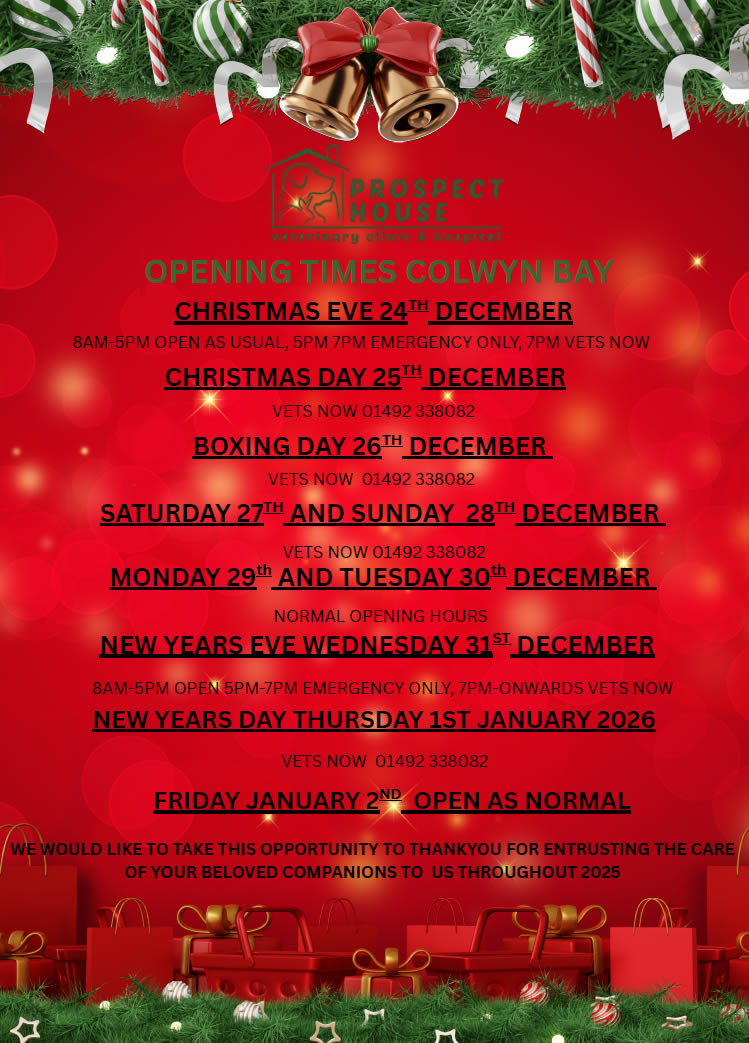
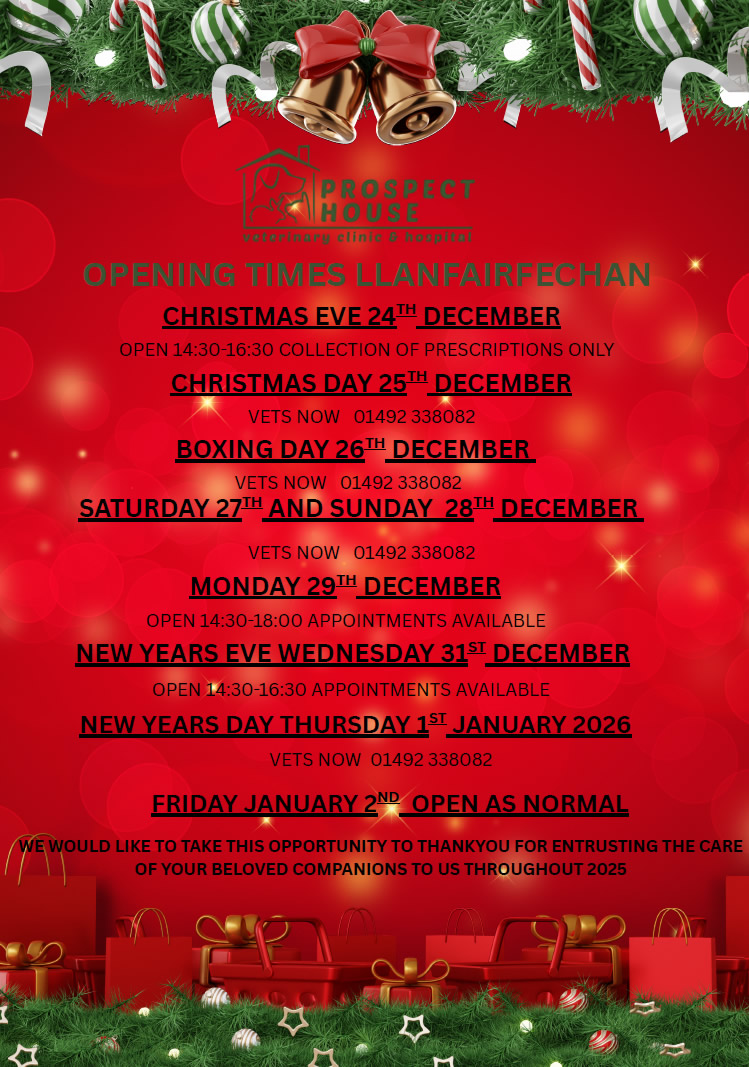
**PLEASE ENSURE ALL REPEAT PRESCRIPTIONS ARE ORDERED AHEAD OF THE CHRISTMAS BREAK AND ALLOW 48 HRS FOR COMPLETION**
We would like to take this opportunity to thank you for ensuring the care of your beloved companions with us throughout 2025
We wish you and your pets a very happy and healthy new year!
From all the team at Prospect House Veterinary Clinic and Hospital
The festive period is fun for all of us but it can also be a dangerous time for our pets.
To help keep them safe we have prepared a list of hazards to be aware of around the festive period
Dangerous food and drink
There are many food items that are toxic to animals all year round but at Christmas some are much more likely to be left around. Please keep food and drink out of reach of your pets, especially –
- Chocolate – this contains theobromine which can be toxic to pets in even small amounts. The highest levels of this chemical are found in dark chocolate and cocoa powder but any type of chocolate can cause problems.
- Grapes and dried vine fruits – these can lead to kidney damage if eaten by cats and dogs. Many Christmas foods contain these including Christmas pudding, mince pies, dried fruit mixes, chocolate coated raisins and Christmas cake.
- Onions and garlic – plants from the onion family can cause damage to red blood cells and lead to a dangerous type of anaemia
- Macadamia nuts – ingestion by pets can lead to tremors, weakness and high body temperature
- Alcohol – this is much more toxic to pets than humans as their liver struggles to break it down
- Blue Cheese – contains roquefortine C which is toxic to dogs
- Artificial sweeteners – xylitol is found in chewing gum and some sugar free confectionary. It is very dangerous to pets even in small amounts, causing low blood sugar and liver failure
- Cooked bones – bone splinters can cause intestinal damage or blockages
- Mouldy food – as well as the dangers from the foods themselves mould can produce mycotoxins leading to liver damage, tremors and seizures
- Fatty foods – sharing food high in fat with dogs can lead to stomach upsets ranging from mild diarrhoea up to severe pancreatitis. Such foods can include turkey skin, sausages and buttered vegetables
If you would like to make your pets feel special with titbits from your Christmas food you could give them small amounts of boiled vegetables such as carrot, sprouts, peas, potatoes, green beans or swede. They can also have turkey meat (without skin or bones) and white fish
Decorations and presents
Some pets don’t just have a taste for Christmas food and drink, they may also try to eat our festive decorations
- Pine needles – can cause cuts in the mouth and digestive upsets
- Glass baubles – these can shatter when played with or eaten by pets leaving dangerous sharp pieces
- Tinsel – if eaten by cats and dogs this can cause blockages and damage to the intestines
- Fairy lights – chewing these can given pets an electric shock
- Toxic plants – ponsietta, mistletoe, potpourri and ivy can cause stomach upsets. Lilies and their pollen are highly toxic to cats
- Toys – when eaten these can cause intestinal blockages. Eating toys with batteries in can lead to chemical burns and metal poisoning
- Wrapping paper – although this is not toxic if eaten in large quantities paper can cause obstruction of the intestines
Celebrations
Gatherings over the festive period can often involve large numbers of people, loud noises and sometimes fireworks. Some of our pets can find these stressful and may need somewhere they can hide and feel safe. A lot of the same principles apply from our advice tips for helping our pets around firework night, please see our website to recap on these
Winter weather
Remember that in icy conditions the roads and pavements may be gritted. As well as the salt being irritant to your dog’s feet some grit can contain toxic antifreeze chemicals. Try to wash feet down after walking in gritted areas.
Some pets, cats in particular, can find anti freeze very palatable so make sure any bottles are out of reach and any spillages are cleaned up. Even small amounts of antifreeze can lead to tremors and kidney damage.
Make sure that water supplies are not frozen over for outdoor pets and provide them with well bedded sheltered areas to keep warm in.
With dark nights and mornings make sure you and your pet can be easily seen by vehicles when walking. Reflective and lit collars are widely available for dogs.
We hope this advice helps give you and your pets a safe and enjoyable Christmas. If you have any further questions or are concerned your pet may have eaten something unusual please get in touch with our practice team.
New Year Update
New Year Update News at Prospect House Vets
Could it be osteoarthritis?
IS IT JUST A CASE OF OUR PETS ‘GETTING OLD’? SHOULD WE JUST ACCEPT THE INEVITABLE DETERIORATION AND SLOWING DOWN?
Winter Newsletter
Read all our latest winter news at Prospect House Vets


